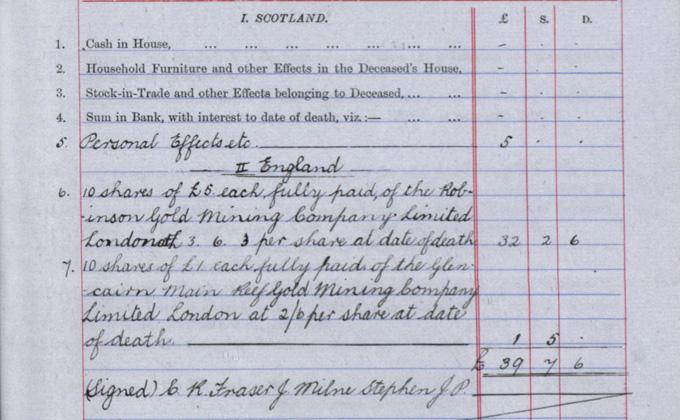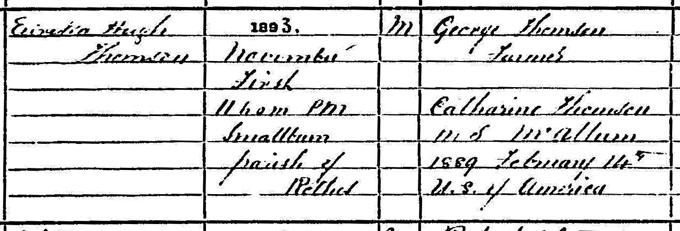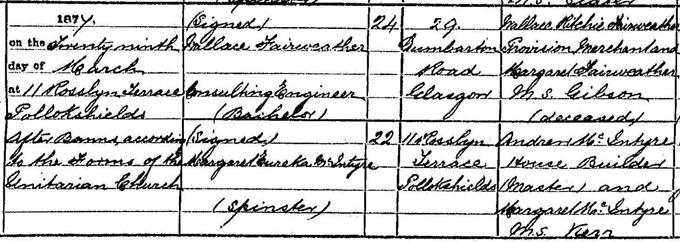‘Eureka!’ exclaimed the ancient Greek scholar, Archimedes, as he stepped into a bath and noticed the water level rise. He realised that the displacement of water must be equal to the volume of the part of his body he had submerged. The word ‘Eureka’, is derived from the ancient Greek ‘heúrēka’ which means ‘I have found (it)’ and, overtime, became adopted by others when they made a new discovery.
This was true in the case of the discovery of gold during the gold rush across Victoria, Australia, and in California, America, in the 1850s. Indeed, the city of Eureka was established in California in 1850 and, since 1963 the state motto has been ‘Eureka’. Scotland also enjoyed a gold rush in the 1860s following a newspaper announcement that gold had been discovered in the Strath of Kildonan, in the Scottish Highlands, sending many hopeful people north to pan for the shimmering metal.
Some families with a close connection with gold, its discovery and trade, chose to commemorate this when naming their children and this is evident in birth records held by the National Records of Scotland (NRS) made available via Scotland's People.
Eirene Eureka Fraser
Eirene Eureka Fraser, for example, appears in the 1911 census as the 25 year old niece of a general merchant, William Hay, living in Rosebank, Aberdeenshire. The census records that Eirene was born in Australia. This fact, alongside her middle name, suggests she had a link to a town with gold.
Before arriving in Scotland, the Edinburgh Gazette, 10th September 1901, records that she had been appointed as a ‘Female Learner’, Post Office, Birmingham. Eirene was a telegraphist, a role in which many women at that time were employed, partly due to perceptions of female dexterity.
Just a couple of years after the census was taken, she died on 10th May 1913 from pulmonary tuberculosis (TB). The inventory of her estate details that she had shares in the Robinson Gold Mining Company, London, and the Glencairn Main Reef Gold Mining Company, London, both of which had links to South African gold. Her estate was valued at £39, 7 shillings and 6 pence and was awarded to her mother, Christina Hay.

Detail from the inventory of the personal estate of Eirene Eureka Fraser, 21 June 1913.
Wills and Testaments, Aberdeen Sheriff Court Inventories.
Crown copyright, NRS, SC1/36/167 page 995.
Eureka Hugh Thomson
Eureka Hugh Thomson was born on 1st November 1893 in the parish of Rothes, Elgin, to George Thomson, farmer and his wife Catherine. Although both George and Catherine were born in Scotland, they were married in America on Valentine’s Day 1889. Their first child, Kate, was born in America before the family moved to the Argentine Republic where their second daughter, Lizzie was born. By 1893 they were living in Scotland again, where Eureka was born. In the 19th century there were gold rushes in both North America and Argentina. It is therefore possible that Hugh’s parents had lived or worked in areas connected to gold during their time abroad, commemorating this when naming their son.

Detail from the birth entry of Eureka Hugh Thomson, 1 November 1893.
Crown copyright, NRS, Statutory Register of Births, 141/68 page 23.
During World War One, Eureka served as a Corporal, Seaforth Highlanders, in the Labour Corps. Over 10% of the total number of men serving in the army were based in the Labour Corps with around 175,000 men working in the United Kingdom and other theatres of war (more information can be found at the Forces War Records website). Eureka was sent to Western Europe to fight, and disembarked on 5th December 1915. He was discharged on 1st March 1919 and awarded the ’15 star – a campaign medal of the British Empire awarded to officers and men of British and Imperial forces who served in any theatre of war during 1914 and 1915.
Lady Margaret Eureka Fairweather
Lady Margaret Eureka Fairweather was born Margaret Eureka McIntyre in Ballarat, Victoria, Australia in 1855, the daughter of Andrew and Margaret McIntyre. Her parents had only arrived in Australia three years earlier; her father working as a gold prospector. No doubt this occupation inspired his daughter’s middle name.
The Eureka Rebellion, or Eureka Stockade as it is sometimes called, occurred in Ballarat the year before Margaret’s birth. A group protest took place with 150 gold diggers protesting against the imposition of mining licences where licence holders had to pay fees regardless of whether or not they found gold. Protesters were attacked by government forces and 30 miners were killed. When the captured rebels faced trial in Melbourne, strong public support achieved their release.
By 1877 Margaret had arrived in Scotland and in March of that year she married Wallace Fairweather, an engineer, in Glasgow.

Marriage entry of Wallace Fairweather and Margaret Eureka McIntyre, 29 March 1877
Crown copyright, NRS, Statutory Register of Marriages, 1877, 644/13
Margaret became a well-known figure in Glasgow and the west of Scotland. She took great interest in various public affairs and supported causes relating to education and the welfare of school children, and became a Justice of the Peace for Renfrewshire. When Wallace was knighted in 1933 she became known as Lady Margaret Eureka Fairweather. Lady Fairweather died two years later on 4 August 1935.

Death entry of Lady Margaret Eureka Fairweather, 4 August 1935
Crown copyright, NRS, Statutory Register of Deaths, 1935, 571/2 47 page 16
Margaret’s daughter Minnie Fairweather married Guy Morton, a curtain and carpet manufacturer in Glasgow in 1899. When their daughter, Margaret, was born on 4 January 1902 they chose Eureka as her middle name, continuing their familial link to Australia and the gold rush.
For more information about the statutory register of births, statutory register of deaths and wills and testaments please see our record guides.